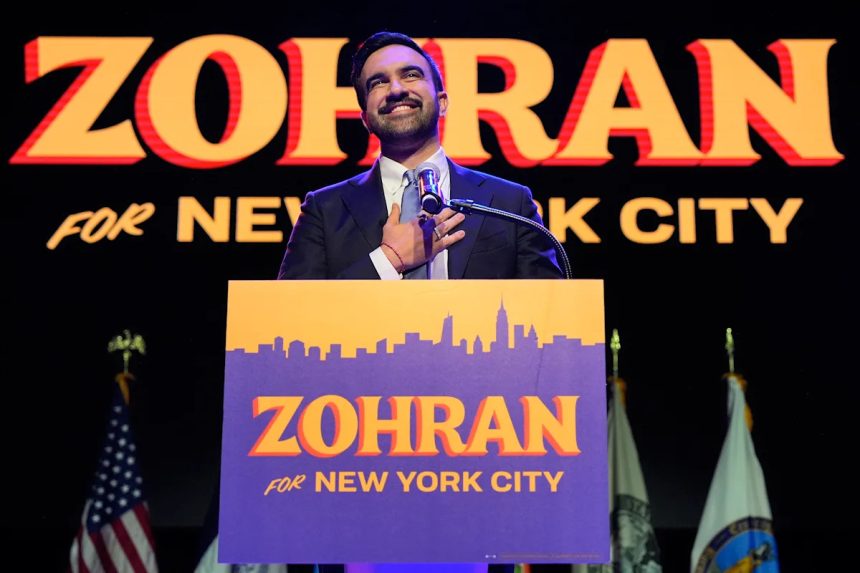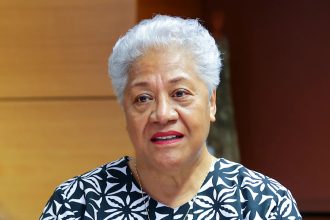NEW YORK — Zohran Mamdani’s narrow but historic win for New York City mayor gives him both a mandate and an immediate test: whether he can govern a divided city that has never elected someone like him before.
The 34-year-old democratic socialist — set to be the city’s first Muslim mayor — entered Wednesday facing both celebration and unease. His victory over moderate Democrat Andrew Cuomo was fueled by record turnout and deep enthusiasm among progressives. But it also exposed raw divides over religion, ideology and identity that will define his first days in office.
Mamdani sought to reassure New Yorkers in the hours after his win. He detailed who would helm his transition team. He vowed to work tirelessly to fulfill his campaign pledge of delivering a more affordable city. And he sought to sooth Jewish New Yorkers, many of whom remain deeply angered by his rhetoric around Israel, both during his campaign and immediately after Hamas’ Oct. 7 attacks.
“I’m proud to be the next mayor having received more than 1 million votes in an election, which saw turnout the likes of which we hadn’t seen since 1969,” he said. “Oftentimes we are assessing the results of an election without asking the question of how many or how few New Yorkers are participating in it.”
Elections tend to unify New Yorkers and the special interest groups whose livelihood depends on City Hall — at least momentarily. But this was an election like no other in recent memory. And for Mamdani, the moment now shifts from campaign to governance — and from symbolism to execution — as he faces the dual challenge of reassuring his critics and proving that his movement can run the nation’s largest city.
The degree of antipathy toward his fledgling administration complicates that dual pursuit. In practical terms, repairing relations with blocs of the city wary of his leadership will require the devotion of significant political capital — energy that could otherwise go toward delivering on his main policy planks. Mamdani told POLITICO he is up to the task.
“I’m ready to bring our city together, and to ensure that we’re not only taking the temperature down, but we’re also delivering on the material needs for each and every New Yorker, and that we do so now having secured a mandate,” Mamdani said.
Preliminary results from the New York City Board of Elections show the 34-year-old beat Cuomo and GOP nominee Curtis Sliwa with 50.4 percent of the vote.
Mamdani, as expected, won progressive strongholds in Brooklyn and dominated the Brooklyn-Queens waterfront that has come to be known as the “commie corridor.” He won staunchly left corners of Manhattan. And as opposed to his June primary victory, the 34-year-old convinced Black voters in Brooklyn, Queens and upper Manhattan to defect from Cuomo while besting the former governor throughout heavily Latino communities in the Bronx.
According to an analysis from The New York Times, Mamdani also flipped low-income New Yorkers who had supported Cuomo in the primary.
But there were large gaps in his coalition.
The Upper West and Upper East sides of Manhattan, tony and politically active neighborhoods home to large Jewish communities, provided Cuomo with a concentrated boost of votes and propelled him to within 10 points of Mamdani. The former governor also won heavily Jewish areas of Brooklyn. And his effort to peel Republican voters off of Sliwa paid off: He won huge swaths of Staten Island, Brooklyn and Queens home to conservative voters apoplectic about Mamdani’s expected victory.
Polling before the race and exit polls conducted immediately after found a consistent trend: a significant number of Cuomo supporters were voting for the former governor not because they liked his ideas, but because he was the best hope to stop Mamdani, a grim statistic emphasizing just how off-putting the democratic socialist has been to many New Yorkers.
As soon as the race was called, it became clear these divisions will persist into Mamdani’s term.
“We cannot ignore that the Mayor-elect holds core beliefs fundamentally at odds with our community’s deepest convictions and most cherished values,” read a joint statement from several prominent New York and New Jersey Jewish groups, including the UJA-Federation of New York, released moments after Mamdani won. “As we have done for over a century, we will continue to work across every level of government to ensure that our city remains a place where our Jewish community, and all communities, feel safe and respected.”
The Anti-Defamation League said it would be creating a new initiative to track and monitor policies and appointments.
“Mayor-elect Mamdani has promoted antisemitic narratives, associated with individuals who have a history of antisemitism and demonstrated intense animosity toward the Jewish state that is counter to the view of the overwhelming majority of Jewish New Yorkers,” Jonathan Greenblatt, head of the organization, said in a statement. “We are deeply concerned that those individuals and principles will influence his administration at a time when we are tracking a brazen surge of harassment, vandalism and violence targeting Jewish residents and institutions.”
Mamdani said at an unrelated press briefing Wednesday that he has not spoken to Greenblatt about the initiative but that he plans to combat antisemitism.
In his interview with POLITICO, the mayor-elect conceded there were many New Yorkers skeptical of his administration, including those in the Jewish community, working on Wall Street and those with more moderate or conservative worldviews. The democratic socialist explained that animosity by pointing to an avalanche of outside spending against him.
“I don’t begrudge them that, because they’ve been subjected to around $40 million in attack ads,” Mamdani said. “My job is to introduce myself as I am, as opposed to the caricature that they’ve been given.”
Mamdani avoided any concessions of his own rhetoric that might have stoked those feelings, which prompted some of the richest city residents to spend a fortune opposing the next occupant of City Hall.
Kathy Wylde, head of the Partnership for New York City, a nonprofit that advocates on behalf of some of the largest corporations in the city, said that most of the opposition from c-suite executives came from Mamdani’s lack of experience.
“That was the rap that stuck with the majority of the people that I have spoken to,” she said. “He’s going to be learning on the job, but that’s something they can live with.”
Some of the biggest funders to the opposition, Wylde noted, were convinced Mamdani presents a threat to the Jewish community. However, she added that many were swayed by negative campaign ads inflected with Islamophobia, and that meeting Mamdani in person often assuaged their anxieties.
Going forward, Wylde argued, the mayor-elect could instill further confidence by making smart hires.
“The single most important thing he can do to neutralize these fears is through strong professional appointments so it’s clear the people running the city and making policy decisions are professionals that everyone can trust,” Wylde said.
To that end, Mamdani announced a transition team helmed by former First Deputy Mayor Maria Torres-Springer, former Federal Trade Commission Chair Lina Khan, nonprofit president Grace Bonilla and city budget expert Melanie Hartzog. Elana Leopold, who served under former Mayor Bill de Blasio before becoming a senior Mamdani campaign adviser, will be the transition’s executive director.
He has also expressed interest in keeping NYPD Commissioner Jessica Tisch, beloved by many of the anybody-but-Mamdani factions. And the mayor-elect has struck up a collaborative relationship with the far-more-moderate Gov. Kathy Hochul, who holds the fate of many Mamdani campaign promises in her hand.
“The governor has set a very good example for what it can look like to both keep a door open to speak with anyone about anything that could serve the interests of the people of this state, while also refusing to sacrifice those same people for the purpose of maintaining a relationship,” Mamdani said at his transition announcement Wednesday.
Emily Ngo contributed reporting.









